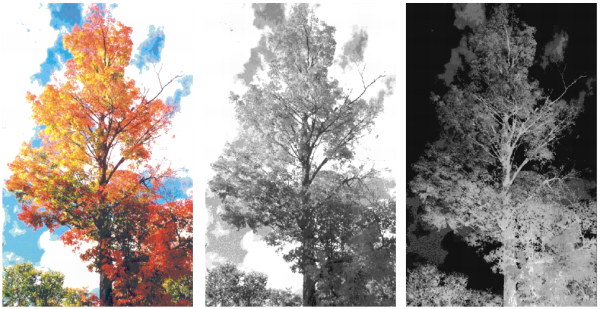Corel Painter Help :
Alpha Channels : Generating channels automatically
Quick links to procedures on this page:
Corel Painter can automatically generate a channel based on the light and dark areas of a number of sources, including paper, pattern, and clone source. For example, you can create a channel based on the luminance values of a clone. You can also create a channel based on a range of colors. These methods are similar to automatically generating pixel-based selections. For more information, see Creating pixel-based selections.
An image (left), the channels created using image luminance (middle), and inverted image luminance (right)
| 1 . |
In the Channels panel, do one of the following: |
| 3 . |
In the New From dialog box, choose one of the following options from the list box: |
|
• |
Paper — uses the current paper texture to create the channel |
|
• |
3D Brush Strokes — creates a channel based on the difference between the current image and the clone source. If no clone source is selected, Corel Painter uses the current pattern. |
|
• |
Original Selection — works only when performing offset sampling between documents. It allows you to create a channel in the sampling destination document that is based on a selection made in the sampling source document. For best results, the dimensions of the source and destination documents should match. You must establish a link between an offset sampling source and destination document for this option to be available. For more information, see Cloning image areas. |
|
• |
Image Luminance — creates a channel based on the current image’s light and dark areas. For Image Luminance to be effective, the image must have high contrast. Images with low contrast produce a semisolid channel, without clear delineation between the selected and protected areas. |
|
• |
Original Luminance — produces a channel based on the clone source’s light and dark areas. This option lets you import an image to the channel. If no clone source is selected, Corel Painter uses the current pattern. |
|
• |
Current Color — creates a channel based on pixels of the current main color. Areas of the current color are protected; the rest of the image is selected. You might want to use the Dropper tool to pick a color from the image before using the Current Color option. |

Like a grayscale image, a channel can have 256 values in it. Inverting a channel is equivalent to creating the negative of a grayscale image. For example, a pixel with 80% luminance will have 20% luminance when inverted. A pixel with 30% luminance will have 70% luminance when inverted.
| 1 . |
In the Channels panel, do one of the following: |
| 3 . |
With the New Channel from Color Range dialog box open, click in the document window to pick a color. |
| 5 . |
In the New Channel from Color Range dialog box, adjust the Range slider in the Hue, Saturation, and Value areas. |
| 6 . |
In the New Channel from Color Range dialog box, adjust the Feather slider in the Hue, Saturation, and Value areas. |

The channel displays as a red overlay on the image in the Preview window of the New Channel from Color Range dialog box. You can drag in the Preview window to display other parts of the image.
